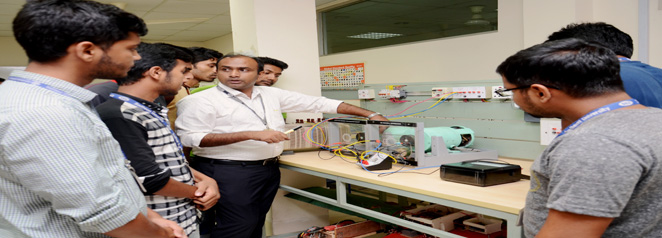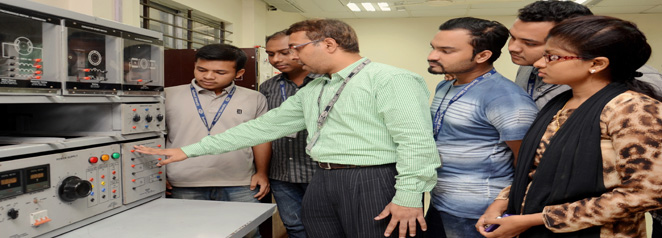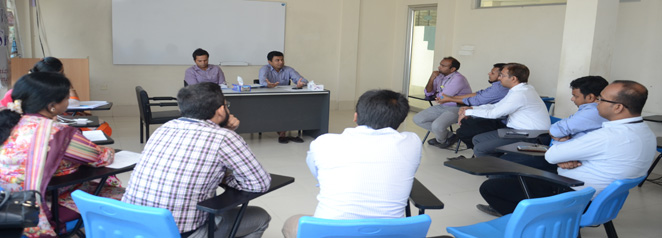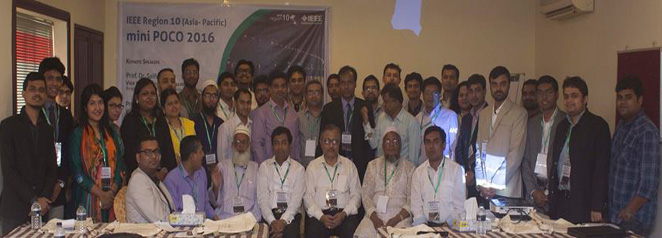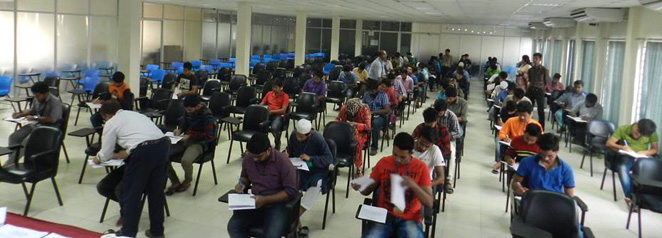
|
Mathematics Courses: [All Mathematics Courses are compulsory] (15 Credits) |
||
|
MATH 1101 |
3 |
|
|
MATH 1203 |
Mathematics II (Complex Variables, Fourier Series and Transforms) |
3 |
|
MATH 1305 |
Mathematics III (Ordinary and Partial Differential Equations) |
3 |
|
MATH 2107 |
Mathematics IV (Linear Algebra, Co-ordinate Geometry and Vector Analysis) |
3 |
|
MATH 2209 |
3 |
|
|
Sub Total |
15 |
|
MATH 009 Remedial Mathematics Course
0 credits, 3 hours/week
Algebra: Set, function, hyperbolic function, matrix, series-exponential, logarithmic and trigometric function, complex numbers.
Geometry: Coordinate, direction cosines, circle, plane, straight line, sphere, parabola, hyperbola, ellipse.
Trigonometry: Plane trigonometry, spherical trigonometry, trigonometric ratios of associated and compound angles, circular function.
Calculus: Differential calculus, limits, addition, multiplication, division, Integral calculus, substitution method, integration by parts, reduction formulae, definite integral.
MATH 1101 Mathematics I (Differential and Integral Calculus)
3 credits, 3 hours/week
Differential Calculus: Limits, continuity and differentiability. Successive differentiation of various types of functions. Leibnitz's theorem. Rolle's theorem, Mean value theorem, Taylor's and Maclaurin's theorems in finite and infinite forms. Lagrange's form of remainders. Cauchy's form of remainders. Expansion of functions, evaluation of indeterminate forms of L Hospital's rule. Partial differentiation. Euler's theorem. Tangent and normal. Subtangent and subnormal in cartesian and polar co-ordinates. Determination of maximum and minimum values of functions.Curvature. Asymptotes. Curve tracing.
Integral Calculus: Integration by the method of substitution. Standard integrals. Integration by successive reduction. Definite integrals, its properties and use in summing series. Walli's formulae. Improper integrals. Beta function and Gamma function. Area under a plane curve and area of a region enclosed by two curves in cartesian and polar co-ordinates. Volumes and surface areas of solids of revolution.
MATH 1203 Mathematics II (Complex Variables, Fourier Series and Transforms)
3 credits, 3 hours/week
Complex Analysis: Complex Variable: Complex number system. General functions of a complex variable. Limits and continuity of a function of a complex variable and related theorems. Complex differentiation and the Cauchy-Riemann equation. Infinite series. Convergence and uniform convergence. Line integral of a complex function, Cauchy integral formula. Liouville's theorem. Taylor's and Laurent's theorem. Singular points. Residue, Cauchy's residue theorem.
Fourier Series: Real and complex form. Finite transform. Fourier Integral. Fourier transforms and their uses in solving boundary value problems.
Laplace Transforms: Definition, Theorems and properties of Laplace transformation. Laplace transforms of some elementary functions; Inverse Laplace transforms;
Laplace transforms of derivatives. The unit step function; Periodic function; Some special theorems on Laplace transforms; Partial fraction; Solutions of differential equations by Laplace transforms; Evaluation of improper integrals.
MATH 1305 Mathematics III (Ordinary and Partial Differential Equations)
3 credits, 3 hours/week
Ordinary Differential Equations: Degree and order of ordinary differential equations, formation of differential equations. Solution of first order differential equations by various methods. Solution of general linear equations of second and higher orders with constant coefficients. Solution of homogeneous linear equations. Solution of differential equations of the higher order when the dependent or independent variables are absent. Solution of differential equation by the method based on the factorization of the operators. Frobenius method.
Partial Differential Equations: Introduction. Linear and non-linear first order equations. Standard forms. Linear equations of higher order. Equations of the second order with variable coefficients. Wave equations. Particular solution with boundary and initial conditions.
MATH 2107 Mathematics IV (Linear Algebra, Co-ordinate Geometry and Vector Analysis)
3 credits, 3 hours/week
Linear Algebra: Definition of matrices. Algebra of matrices. Transpose of a matrix and inverse of matrix. Factorization. Determinants. Quadratic forms. Matrix polynomials .Euclidean n-space. Linear transformations from IRn to IRm. Properties of' linear transformations from IRn to IRm. Introduction to systems of linear equations. Gaussian elimination. Real vector spaces and subspaces. Basis and Dimension. Rank and Nullity. Linear combination. Linear dependency and Independency. Inner product spaces: Gram-Schmidt process and QR-Decomposition. Eigen values and Eigen vectors. Diagonalization. Linear transformations: Kernel and Range., Application of linear algebra to electric networks.
Co-ordinate Geometry: Two dimensional coordinate geometry: Changes of axes: Transformation of co-ordinates, simplification of equation of curves, Conic section (pair of straight line, system of circle, parabola, Ellipse, Hyperbola). Three dimensional coordinate geometry: System of coordinate, distance between two points, section formula, projections, direction cosines, equations of planes and lines.
Vector Analysis : Multiple product of vectors. Linear dependence and independence of vectors. Differentiation and integration of vectors together with elementary applications. Line, surface and volume integrals. Gradient of a scalar function, divergence and curl of a vector function. Various formulae. Integral forms of gradient, divergence and curl. Divergence theorem. Stoke's theorem, Green's theorem and Gauss's theorem.
MATH 2209 Mathematics V (Probability and Statistics)
3 credits, 3 hours/week
Introduction: Definition of statistics: Population and Sample, Parameter, Variable, constant and Frequency distribution. Graphical presentation of Frequency distribution. Sets and Probability, Random Variables, Properties Describing Distributions, Discrete Probability Distributions, Normal Distribution, Sampling Theory, Estimation Theory. Elementary probability theory and discontinuous probability distribution, (binomial, Poisson and negative binomial); Characteristics of distributions; Elementary sampling theory; Estimation; Hypothesis testing and regression analysis.
Measures of central tendency: Arithmetic Mean, median, mode, Geometric mean and harmonic mean. Measures of dispersion: Range, Standard deviation, Mean deviation, Quartile deviation and Variance. Moments, skewness and kurtosis, Mathematical expansion.

